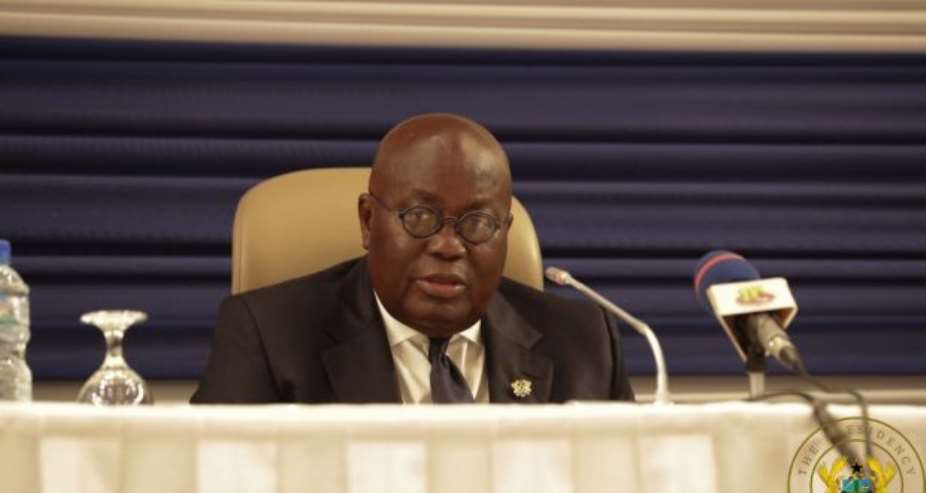President Akufo-Addo says the government’s decision to deport Chinese national, Aisha Huang for engaging in illegal mining was a mistake.
“I think the decision to deport Aisha Huang in hindsight was a mistake and that is why that process and procedure is being stopped,” he said at a forum at Princeton University in the United States during his visit to the United States of America.
Aisha Huang gained some notoriety after her arrest and was tagged as the Galamsey Queen.
She had been charged with three counts of undertaking small-scale mining operations, contrary to Section 99 (1) of the Minerals and Mining Act, 2006 (Act 703); providing mining support services without valid registration with the Minerals Commission, contrary to the Minerals and Mining Act, 2006 (Act 703), and the illegal employment of foreign nationals, contrary to the Immigration Act, 2000 (Act 573).
During the prosecution, the government controversially discontinued the case and deported her.
More controversy followed when the Senior Minister, Yaw Osafo Maafo, at a town hall meeting in the US suggested that Aisha Huang did not face the full rigours of the law for diplomatic reasons.
But with recent developments in legislation to fight illegal mining, the President does not expect such a mistake to occur again.
A foreigner engaged in illegal mining now faces a term of imprisonment of not less than 20 years and not more than 25 years per the amended Minerals and Mining Act.
“The response to that has been the amendment of the law that… enhances sanctions for people; both Ghanaians and foreigners who are engaged [in illegal mining].”
Government officials in Galamsey
The President was responding to a question from a Ghanaian resident in the US state of Colorado, who also asked the President about reports of his own officials being involved in illegal mining.
He also claimed he had evidence implicating some government officials.
But President Nana Akufo-Addo questioned why the Ghanaian, one Solomon Owusu, had not come forward with his evidence.
People make these statements but they never come forward to produce the evidence. It is difficult but if you have it, why do you keep it, why don't you send it to the authorities in Ghana…what is the purpose of this information you have on you in Colorado? It is needed in Accra, not in Colorado.”
The President stressed that he was “interested in getting hold of information that will allow a proper investigation to be carried out, and then the consequences taken.”
Read a transcript of what President Akufo-Addo said below;
"First of all, the fight against illegal mining in Ghana is something that has not been systematically undertaken until I came into office.
"So, it's a first step... I think the decision that was made to deport the Aisha woman on hindsight was a mistake and that is why that procedure has been stopped.
"The attitude and the thinking was that, the problems involved in prosecuting and then having to hibernate and look after etc... It was just better to send the person... But I think it was a mistake and the response to that has been the amendment of the law that has now stiffened and enhanced the sanctions for people, both Ghanaians and foreigners who are engaged."
Deportation
Aisha and four other Chinese nationals who were arrested for their involvement in illegal mining (galamsey) in Ghana, were deported after the state filed a nolle prosequi to discontinue the trial.
A State Attorney, Ms Mercy Arthur, presented the application for nolle prosequi to the Accra High Court, presided over by Mr Justice Charles Ekow Baiden.
Based on the application, the court discharged the five accused persons.
She was charged with three counts of undertaking small-scale mining operations, contrary to Section 99 (1) of the Minerals and Mining Act, 2006 (Act 703); providing mining support services without valid registration with the Minerals Commission, contrary to the Minerals and Mining Act, 2006 (Act 703), and the illegal employment of foreign nationals, contrary to the Immigration Act, 2000 (Act 573).
The other four accused persons were charged with disobedience of directives given by or under the Immigration Act, 2000 (Act 573).
According to the prosecution, Aisha had a mining concession at Bepotenten and also operated a mining support services company.
The four other accused persons, it said, were employed by Aisha to work at the mining site.
The prosecution claimed checks at the Minerals Commission, however, revealed that Aisha had no licence to operate either a mine or a mining support services company.
They also contended that the visas issued to all the five Chinese by the Ghana Embassy in Beijing, China, did not allow them to work in Ghana.
---citinewsroom with additional files from graphic.com.gh





 Akufo-Addo commissions Phase II of Kaleo solar power plant
Akufo-Addo commissions Phase II of Kaleo solar power plant
 NDC panics over Bawumia’s visit to Pope Francis
NDC panics over Bawumia’s visit to Pope Francis
 EC blasts Mahama over “false” claims on recruitment of Returning Officers
EC blasts Mahama over “false” claims on recruitment of Returning Officers
 Lands Minister gives ultimatum to Future Global Resources to revamp Prestea/Bogo...
Lands Minister gives ultimatum to Future Global Resources to revamp Prestea/Bogo...
 Wa Naa appeals to Akufo-Addo to audit state lands in Wa
Wa Naa appeals to Akufo-Addo to audit state lands in Wa
 Prof Opoku-Agyemang misunderstood Bawumia’s ‘driver mate’ analogy – Miracles Abo...
Prof Opoku-Agyemang misunderstood Bawumia’s ‘driver mate’ analogy – Miracles Abo...
 EU confident Ghana will not sign Anti-LGBTQI Bill
EU confident Ghana will not sign Anti-LGBTQI Bill
 Suspend implementation of Planting for Food and Jobs for 2024 - Stakeholders
Suspend implementation of Planting for Food and Jobs for 2024 - Stakeholders
 Tema West Municipal Assembly gets Ghana's First Female Aircraft Marshaller as ne...
Tema West Municipal Assembly gets Ghana's First Female Aircraft Marshaller as ne...
 Dumsor is affecting us double, release timetable – Disability Federation to ECG
Dumsor is affecting us double, release timetable – Disability Federation to ECG
